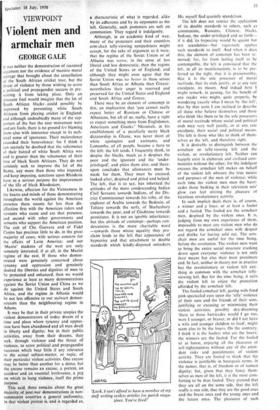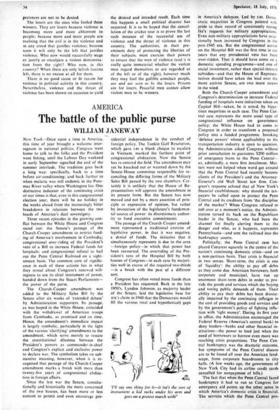VIEWPOINT
Violent men and armchair men
GEORGE GALE
It was neither the demonstration of reasoned argument nor the evidence of massive moral outrage that brought about the cancellation of the South African cricket tour, but the threat of violence by those wishing to score a political and propagandist success in pre- venting it from taking place. Only an innocent fool would imagine that the lot of South African blacksvcould possibly be improved -by preventing white. South Africans from playing cricket in England; and although undoubtedly many of the sup- porters of the ban the tour movement were and are fools, there is no ground for blaming them also with innocence except in its tech- nical sense of ignorance. Their malevolence exceeded their benevolence: for I think it can scarcely be doubted that the vehemence of their hatred of white South Africa was and is greater than the vehemence of their love of black South Africans. They do not seriously seek to improve the lot of the Bantu, any more than those who imposed, and keep imposing, sanctions upon Rhodesia have as a serious purpose the improvement of the life of black Rhodesians.
Likewise, affection for the Vietnamese in the hearts and minds of those demonstrating throughout the world against the American presence there counts far less than dis- affection first with the American rulers and servants who cause and are that presence, and second with other governments and servants who support the American position. The cult of Che Guevara and of Fidel Castro has precious little to do, in the great majority of cases, with serious concern for the affairs of Latin America: and our 'Maoist' students of the– west are only remotely interested, if at all, in the Maoist regime of the east. If those who- demon- strated were genuinely concerned about tyranny and oppression and genuinely desired the liberties and dignities of men to be protected and enhanced, then we would experience at least as many demonstrations against the Soviet Union and China as we do against the United States and South Africa, and the regime in Albania would be not less offensive to our stalwart demon- strators than the neighbouring regime in Athens.
It may be that in their priva-te utopias the violent demonstrators of today dream of a time and place where tyranny and oppres- sion have been abandoned and all men dwell in liberty and dignity; but in their public activities, away from their dreams, they seek, through violence and the threat of violence, to score political and propagandist successes which bear little if any relevance to the actual subject-matter, or topic, of their particular violent activities. One excuse may be better than another for a demo, but the excuse remains an excuse, a pretext, an accident and an essential irrelevance, a peg on which to hang violence, itself the prime purpose.
This said, there remains about the great majority of post-war demonstrations in non- communist countries a general uniformity, in that violent protest is, and is regarded as, a characteristic of what is regarded, alike by its adherents and by its opponents as the left. Generally, such protesters are soft on communism. They regard it indulgently.
Although, in an academic kind of way, many of the- protesters and their countless arm-chair telly-viewing sympathisers might accept, for the sake of argument as it were, that the regime of the Soviet Union or of Albania was worse, in the sense of less liberal and less democratic, than the regime of the United States or of England; and although they might even agree that the Soviet Union was no better in these senses than South Africa or Albania than Greece: nevertheless their anger is reserved and preserved for the United States and England and South Africa and Greece.
There may be an element of contempt in this, an implication that 'you cannot, really expect better of Russians or Chinese or Albanians, but all of us, really, have a right to expect something more from Englishmen, Americans and Greeks.' Nkrumah, in his establishment of a peculiarly nasty black dictatorship in Ghana, was never short of white apologists and assistants, and Lumumba, of all people, became a hero to the left: the left tends, I frequently think, to despise the blacks, much as it despises the poor and the ignorant and the 'under- privileged', and pities them also, and there- upon concludes that allowances must be made for them. They must be excused, looked after, despised and pitied and helped. The left, that is to say, has inherited the attitudes of the more condescending Indian Civil Servants towards Indians, of the Dis- trict Commissioner towards his tribe, of the explorer of Arabia towards the Bedouin, of Tolstoy towards the serfs, of Shaftesbury towards the poor, and of Gladstone towards prostitutes. It is not an ignoble inheritance; but this attitude of contempt—perhaps con- descension is the more charitable word —towards those whose equality they pro- claim lends to the left that appearance of hypocrisy and that attachment to double standards which kindly-disposed onlookers like myself find quaintly scandalous.
The left does not restrict the application of its double standards to others, such as
communists, Russians. Chinese, blacks, Indians, the under-privileged and so forth—
if it did. its hypocrisy would be quaint but not scandalous—but vigorously applies such standards to itself. And when it does this, the element of contempt has been re- moved; for, far from feeling itself to be contemptible, the left is convinced that the left, in all its manifestations, is to be pre- ferred to the right, that it is praiseworthy, that it is the sole possessor of moral rectitude, that its ends justify, or at any rate exculpate, its means. And indeed here I might remark, in passing, for the benefit of any reader who might, quite properly, be wondering exactly what I mean by 'the left', that by that term I am inclined to describe all those who believe themselves and those who think like them to be the sole possessors of moral rectitude whose social and political ends may very well justify, or at any rate exculpate, their social and political means. The left is those who like to think of them- selves as the left, and therefore right.
It is desirable to distinguish between the armchair or telly-viewing left and the violent, or revolutionary left. Neither can happily exist in elaborate and civilised com- munities without the other; for the indulgent excuses the armchair left makes on behalf of the violent left obscure the true nature and purposes of the men of violence, while each time the violent men man the barri- cades those basking in their television sets' glow can feel stirring the pleasure of vicarious revolutionary activity.
In such implicit deals there is, of course, a winner and a loser, or at least a fooler and a fooled. The fooled are the armchair men, despised by the violent ones. It is, judging from my own 'experience of them, impossible to meet any violent men who do not regard the armchair ones with despair and dislike for having sold out. The arm- chair men are useful for the time being.
before the revolution. The violent men want to bring the entire social structure crashing down upon everyone: violence is not only their means but also their most proximate end. In fact, neither in theory nor in practice has the revolutionary or violent left any- thing in common with the armchair telly- viewing left. But for the time being, it suits the violent left to enjoy the protection afforded by the armchair left.
The fooled armchair left. gazing with fond pink-spectacled eyes upon the 'silly' violence of their sons and the friends of their sons, justifying or excusing or minimising their
violent activities, possibly day-dreaming 'there to those barricades would I go too, were I younger, or braver, or did I not have a wife and younger children to feed', might seem also to be the losers. On the contrary. I think it is the foolers who are the losers; the winners are the fooled. For the fooled sit at home, enjoying all the pleasures of self-righteousness without any of the atten- dant risks and punishments of violent activity. They are fooled to think that the violence is justifiable in bourgeois terms, in the names, that is, of freedom or of human dignity; but, given that they fancy them- selves as men of the left, it is the most com-
forting to be thus fooled. They pretend that they are all on the same side, that the left really is one side, that they are the good ones and the brave ones and the young ones and the future ones. The pleasures of such pretences are not to be denied.
The losers are the ones who fooled these winners. They are losers because violence is becoming more and more abhorrent to people; because more and more people are realising that the evil is in the violence and in any creed that justifies violence; because soon it will only be the left that justifies violence. Who now would successfully stage or justify or exculpate a violent demonstra- tion from the right? Who now, in this country? When there are only leftish fascists left, there is no excuse at all for them.
There is no good cause or fit reason for violence in political activity in this country. Nevertheless, violence and the threat of violence has been shown on occasion to yield
the desired and intended result. Each time this happens a small political disaster has occurred. It is to be hoped that the cancel- lation of the cricket tour is to prove the last such instance of the successful use of violence and the threat of violence in this country. The authorities, in their pre- eminent duty of protecting the liberties of their subjects, must exercise their powers to ensure that the men of violence (and it is really quite immaterial whether the violent men regard themselves or are regarded as of the left or of the right), however much they may fool the gullible armchair people, are and are seen to be the losers. Prisons are for losers. Peaceful men cannot allow violent men to be winners.























































 Previous page
Previous page